Intergovernmental Panel on Climate Change
The Intergovernmental Panel on Climate Change (IPCC) is an intergovernmental body of the United Nations. Its job is to advance scientific knowledge about climate change caused by human activities. The World Meteorological Organization (WMO) and the United Nations Environment Programme (UNEP) set up the IPCC in 1988. The United Nations endorsed the creation of the IPCC later that year. It has a secretariat in Geneva, Switzerland, hosted by the WMO. It has 195 member states who govern the IPCC. The member states elect a bureau of scientists to serve through an assessment cycle. A cycle is usually six to seven years. The bureau selects experts in their fields to prepare IPCC reports. There is a formal nomination process by governments and observer organizations to find these experts. The IPCC has three working groups and a task force, which carry out its scientific work.
Adoption of the Summary for Policymakers of the IPCC Special Report on Global Warming of 1.5°C in 2018
IPCC Third Assessment Report Working Group I Co-chair Sir John T. Houghton showing a figure that was included in the "Summary for Policymakers" of that report ("hockey stick graph") at a climate conference in 2005
World Meteorological Organization
The World Meteorological Organization (WMO) is a specialized agency of the United Nations responsible for promoting international cooperation on atmospheric science, climatology, hydrology and geophysics.
German meteorologist Gerhard Adrian, president of the World Meteorological Organization, in 2019
WMO headquarters in Geneva, shared with the IPCC and the Group on Earth Observations




